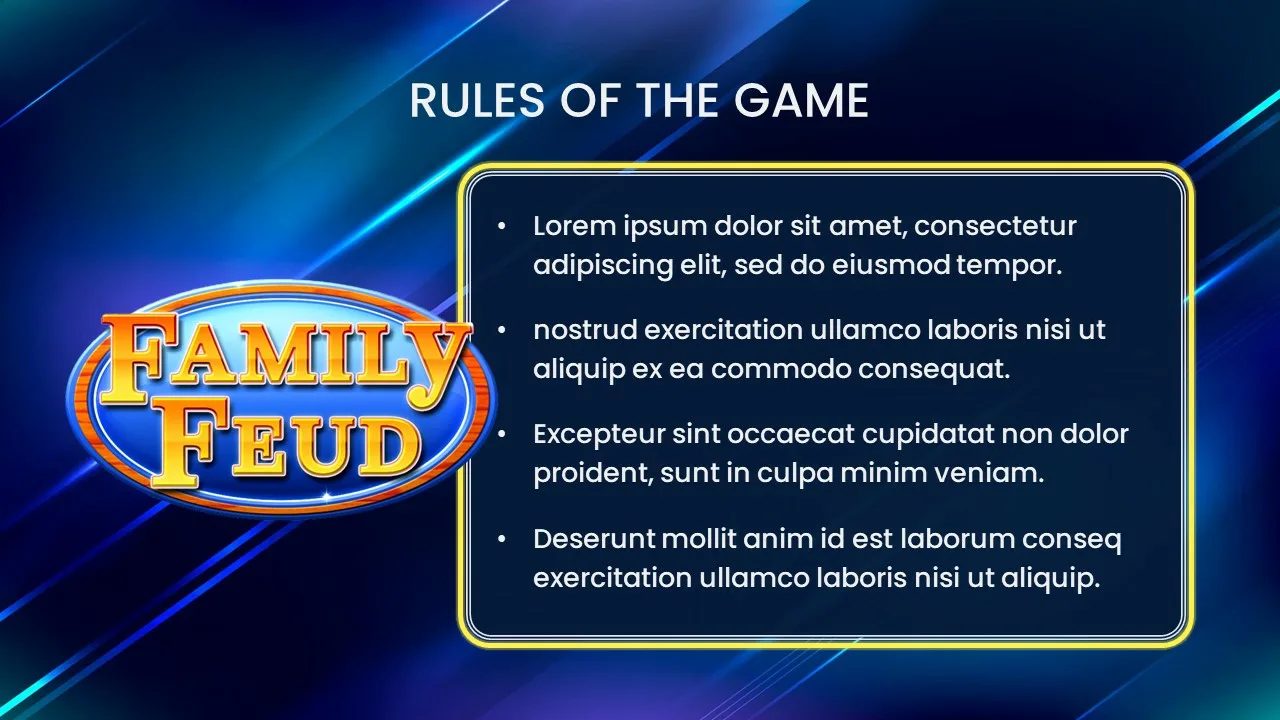Are you ready for some fun, laughter, and maybe a little drama? The "Family Feud" game has been lighting up living rooms and TV screens for decades. Whether you're watching the show or playing the game at home, this classic competition brings families together in a way that no other game can. So, buckle up because we're about to dive deep into why "Family Feud" is more than just a game—it's an experience.
There's something magical about seeing families face off against each other in a battle of wits and witless answers. From iconic moments on the show to hilarious family gatherings around the board game, "Family Feud" has become a cultural phenomenon. And let's be real—it's not just about winning; it's about the memories you create while trying to guess what's in the survey box.
But what makes "Family Feud" so special? Why does it continue to captivate audiences across generations? In this article, we'll explore the history, rules, and secrets behind the game, as well as tips for playing like a pro. Whether you're a fan of the TV show or looking to spice up your next family game night, this is the ultimate guide to "Family Feud."
Table of Contents
- The History of "Family Feud" Game
- Understanding the Rules of the Game
- The Format of the TV Show
- Playing "Family Feud" at Home
- Tips for Winning the Game
- Variants of the Game
- Cultural Impact of "Family Feud"
- Fun Statistics About the Show
- The Role of the Host
- What's Next for "Family Feud"?
The History of "Family Feud" Game
Let's take a trip down memory lane and uncover the roots of "Family Feud." The game show first premiered in 1976, created by the legendary Mark Goodson. It was an instant hit, thanks to its simple yet engaging format. Families competed to see who could guess the most popular answers to survey questions. Over the years, the show has seen several revivals and reboots, but its core concept remains unchanged.
One of the reasons "Family Feud" has stood the test of time is its ability to adapt. From the original host, Richard Dawson, to modern-day hosts like Steve Harvey, each iteration brought something fresh to the table. The show's success lies in its universal appeal—anyone can play, and everyone can relate to the hilarity of family dynamics.
How It All Began
The idea for "Family Feud" was born out of a desire to create a game show that celebrated families. Mark Goodson wanted to showcase the quirks and quirks of family life while keeping things competitive. The original version aired on ABC and quickly became a ratings juggernaut. It was a time when families gathered around the TV to watch shows together, and "Family Feud" provided the perfect mix of entertainment and relatability.
Understanding the Rules of the Game
Now that we've covered the history, let's break down the rules of "Family Feud." The game revolves around survey questions answered by 100 people. Families take turns guessing the most popular answers, with points awarded based on how many people chose that response. The family with the most points wins the round.
Here's a quick rundown of the basic rules:
- Two families compete against each other.
- Each round features a survey question with multiple possible answers.
- Families take turns guessing answers until they either score enough points or "strike out" by guessing three wrong answers.
- The final round, known as the "Fast Money" round, is a high-stakes showdown where one family member answers questions alone.
Common Misconceptions About the Rules
Some people think "Family Feud" is all about luck, but strategy plays a big role. Knowing how to approach the questions and understanding human psychology can give you an edge. For example, if a question asks for the most common reasons people fight, you'd want to think about universal conflicts like money or communication issues.
The Format of the TV Show
The TV version of "Family Feud" has evolved over the years, but its core structure remains the same. Each episode features two families competing in a series of rounds, with the ultimate goal of winning cash and prizes. The host acts as both referee and entertainer, keeping the energy high and the competition fair.
One of the most exciting aspects of the show is the "Fast Money" round. In this final showdown, one family member is isolated and asked a series of rapid-fire questions. Their answers are compared to the survey results, and if they match enough correct answers, their team wins big!
What Makes the Show Unique
Unlike other game shows, "Family Feud" isn't just about answering questions correctly. It's about the chemistry between family members and their ability to work together under pressure. The show also thrives on unexpected answers and hilarious moments, making it a favorite for both casual viewers and die-hard fans.
Playing "Family Feud" at Home
If you're looking to bring the excitement of "Family Feud" into your living room, there are plenty of ways to do it. The official board game is a great option, but you can also create your own version using online survey tools or even just brainstorming questions with your family. The key is to keep things fun and lighthearted.
Here are some tips for hosting your own "Family Feud" game night:
- Divide your group into two teams, ideally consisting of family members or close friends.
- Create a list of survey questions that are relevant to your group. For example, "Name something you always forget when leaving the house."
- Set a timer for each round to add a sense of urgency.
- Award points based on how many people in your group would have chosen each answer.
DIY Survey Questions
Creating your own survey questions is half the fun! Think about topics that resonate with your group, such as favorite foods, travel destinations, or embarrassing moments. The more relatable the questions, the more laughter you'll generate. And remember, it's not about being serious—it's about having a good time.
Tips for Winning the Game
Winning at "Family Feud" isn't just about luck; it's about strategy. Here are some tips to help you dominate the competition:
- Think like the majority. What would most people say when asked this question?
- Communicate with your team. Bounce ideas off each other to come up with the best possible answers.
- Don't overthink it. Sometimes the simplest answers are the most popular.
- Stay calm under pressure. The "Fast Money" round can be nerve-wracking, but focus on one question at a time.
Common Mistakes to Avoid
One of the biggest mistakes players make is trying to be too clever with their answers. While it's tempting to think outside the box, the survey results often reflect straightforward, common responses. Another mistake is not trusting your team. Collaboration is key to success in "Family Feud."
Variants of the Game
Over the years, "Family Feud" has inspired countless spin-offs and adaptations. From celebrity editions to international versions, the game has taken on many forms. Some of these variants include:
- Celebrity Family Feud: Featuring famous families competing for charity.
- Super Feud: A special episode format where families compete for larger prizes.
- International Versions: Adaptations of the show in countries around the world, each with its own unique twist.
Why Variants Matter
These variations keep the game fresh and exciting for audiences. They also allow for new storytelling opportunities, such as showcasing celebrity dynamics or highlighting cultural differences in international versions. Whether you're a fan of the original or one of its spin-offs, there's always something new to discover in the world of "Family Feud."
Cultural Impact of "Family Feud"
"Family Feud" has become more than just a game show; it's a cultural institution. The show has influenced everything from reality TV to social media challenges. Its emphasis on family values and humor has resonated with audiences for decades, proving that laughter truly is the universal language.
One of the most significant impacts of "Family Feud" is its ability to bring people together. In an age where families are often spread out across the globe, the show reminds us of the importance of connection and communication. It also highlights the diversity of human experiences, showcasing the many ways people can relate to each other.
Pop Culture References
"Family Feud" has been referenced in countless movies, TV shows, and even memes. Its iconic format and memorable moments have become part of the cultural lexicon. From Richard Dawson's famous line, "Survey says!" to Steve Harvey's comedic banter, the show has left an indelible mark on popular culture.
Fun Statistics About the Show
Here are some interesting stats about "Family Feud" that might surprise you:
- The show has been on air for over 45 years, making it one of the longest-running game shows in history.
- More than 100 million surveys have been conducted for the show, ensuring a wide range of responses.
- Steve Harvey's version of the show is the highest-rated in syndication history.
Why These Stats Matter
These numbers highlight the show's enduring popularity and its ability to adapt to changing times. They also underscore the importance of quality content that resonates with audiences. Whether you're a fan of the original or the modern version, the stats show that "Family Feud" is here to stay.
The Role of the Host
No discussion of "Family Feud" would be complete without mentioning the hosts who have made the show what it is today. From Richard Dawson's charm to Steve Harvey's wit, each host has brought their own style to the game. Their job isn't just to ask questions; it's to create an atmosphere where families feel comfortable and entertained.
Here's a brief look at some of the most memorable hosts:
- Richard Dawson: Known for his playful demeanor and the famous "kiss" he gave to winners.
- Ray Combs: Brought a youthful energy to the show during the 1990s.
- Steve Harvey: Modernized the show with his humor and relatable approach.
What Makes a Great Host?
A great host knows how to balance competition with camaraderie. They keep the game moving while also allowing for those unexpected, hilarious moments that make "Family Feud" so special. Whether it's cracking jokes or offering words of encouragement, the host plays a crucial role in the show's success.
What's Next for "Family Feud"?
As we look to the future, it's clear that "Family Feud" will continue to evolve. With new technologies and platforms emerging, the show has endless opportunities to reach new audiences. Whether through digital versions, virtual reality experiences, or even more international adaptations, the possibilities are exciting.
But one thing will always remain the same—the heart and soul of "Family Feud" lies in its ability to bring people together. Whether you're watching the show or playing the game at home, the goal is to create memories and laughter that last a lifetime.
Final Thoughts
In conclusion, "Family Feud" is more than just a game—it's a celebration of family, humor, and human connection. Its enduring popularity is a testament to its universal appeal and ability to adapt to changing times. So, whether you're a fan of the TV show or looking to host your own game night, remember that the real winner is the time you spend together.
Now it's your turn! Have you played "Family Feud" at home or watched the show? Share your favorite moments in the comments below and


